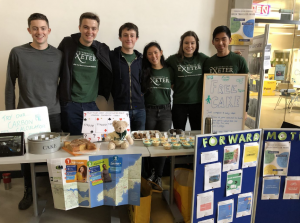
Exploring social media as a form of assessment
12 August 2021
Exploring social media as a form of assessment
From in-class tests to essays to presentations, there are many ways in which module leads can assess their students’ understanding. We know the way in which we assess students’ performance can influence the way in which they engage with learning. Varying how you assess your students can also help students who don’t respond as well to a particular assessment method.
Social media assessments in Geography

Cheat on Meat campaign
Professor Catherine Leyshon has explored using social media as an alternative form of assessment in her third-year module, Climate Change and Society. Students are asked to think about how they would share information about climate change through a contemporary medium.
Students then create campaigns in small groups that they are asked to promote through two different social media platforms. Past platforms have included Twitter, Facebook, and most recently TikTok – which makes for some very engaging, dynamic conversations.
Past campaigns have included: Cheat On Meat – highlighting meat alternatives and raising awareness of the damage to the climate caused by animal farming; The Daily Snack – promoting eating local and sustainable fruit and vegetables; and Grubs Up-Cornwall – who addressed the benefits of alternative food sources such as bugs and insects. This last group highlighted how these food sources can reduce your own carbon footprint, and provided recipes for delicious sustainable treats such as Mealworm pasties.
The Pledge campaign assessment in Climate Change and Society has been the highlight of my degree. By getting us to create social media campaigns, we were forced to creatively engage with the course content in a way we could not otherwise. Making sure we thought beyond the realm of academic writing, we were able to see how the course content related to wider societal issues. This assessment was like no other I have ever heard of. It was so ‘real-world’ focus that it helped us understand how we can use geographical theory in future life and applied to a wider context. Student nomination for Most Innovative Teaching in the 2018 Teaching Awards.

Response to the assessment has been overwhelmingly positive and has previously won Professor Leyshon the Most Innovative Teaching award at the annual Students’ Guild and Students’ Union Teaching Awards.
“Students think the assessment is going to be easy at first because they are just using social media – but it’s really not easy at all,” said Professor Leyshon. “There is no way you can defer your learning. Because the assessment takes place over several weeks, students need to keep learning throughout. This means they have to be actively learning throughout the module.”

In addition to the social media campaign, students attend an event in the Exchange on the Penryn Campus. Each group has a stand and table, and have to think about how they can promote their message in this different forum. Different tactics have included signs, baked goods, and costumes! Unfortunately due to the COVID-19 pandemic this part of the assessment was unable to take place this last year, so the assessment remained entirely online.
The nature of the assessment means that students need to develop different types of skills that are applicable in the workplace. They need to pace themselves when creating content, and if they don’t measure their efforts, they will struggle to keep the content coming. They also need to work well as a team and develop project management skills. Part of the student’s grades comes from their preparation work and the way they record their work. Students are asked to use Trello, a project management software package, to assign tasks to members of the group. These can be accessed by module leads to get a live view of team members’ efforts.

Professor Leyshon has been running this assessment for several years and continues to make adjustments to the way she delivers it.
Her recommendations for anyone attempting a similar type of assessment include:
- Decide the groups yourself as opposed to letting the groups choose their own team members.
- Encourage group members to assign roles.
- Have the groups use Trello or other project management software. This is really helpful for assessing the work undertaken by individual group members.
- This works well for smaller classes: it is currently used on a module with around 40 students on it each year.
Developing marking criteria for a new type of assessment can take some time, as with all teaching innovations. If you are interested in developing your own social media assessment or want to know more about how the assessment operates you can access the current mark scheme here.

